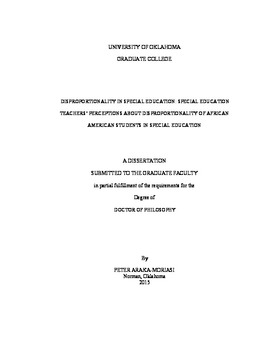| dc.contributor.advisor | Martin, James | |
| dc.contributor.author | Moriasi, Peter | |
| dc.date.accessioned | 2015-06-12T14:20:57Z | |
| dc.date.available | 2015-06-12T14:20:57Z | |
| dc.date.issued | 2015-05-08 | |
| dc.identifier.uri | https://hdl.handle.net/11244/14672 | |
| dc.description.abstract | African American students experience school failure in many different ways and a disproportional number are placed into special education. Disproportionality in special education is an issue that needs to be investigated as it poses a societal concern, because the school and post-school outcomes of students receiving special education are less desirable than peers not receiving special education services. Researchers and educational leaders suggest reasons for ethnic disproportionality in special education, including cultural and historical background of African American students, parental and family perceptions towards educators and special education, special education evaluation procedures used to screen students for special needs, early identification of African American youths and intervention they receive, and perceptions of school personnel towards African American youth.
To explore why perceptions of school personnel contribute to the disproportional numbers of special education placements, I undertook and used qualitative case study methodology to explore African American special education teachers perceptions about cultural misunderstanding as a possible cause for overrepresentation of African American students in special education. I interviewed six African American special educators. The findings strongly suggest cultural misunderstanding exists and it contributes to the disproportionality of African American students in special education. Cultural misunderstanding occurs when educators of African American students fail to recognize underlying factors manifest in the cultural behaviors of African American students. Cultural behaviors are those deemed inappropriate in a learning environment. Cultural misunderstanding impacts more upon African American male youths than females. Implications of these results are also discussed. | en_US |
| dc.language | en | en_US |
| dc.subject | Disproportionality in Special Education | en_US |
| dc.title | DISPROPORTIONALITY IN SPECIAL EDUCATION: SPECIAL EDUCATION TEACHERS’ PERCEPTIONS ABOUT DISPROPORTIONALITY OF AFRICAN AMERICAN STUDENTS IN SPECIAL EDUCATION | en_US |
| dc.contributor.committeeMember | Brandes, Joyce | |
| dc.contributor.committeeMember | Miller, Christine | |
| dc.contributor.committeeMember | Lovett, David | |
| dc.contributor.committeeMember | Williams-Diehm, Kendra | |
| dc.date.manuscript | 2015-05-08 | |
| dc.thesis.degree | Ph.D. | en_US |
| ou.group | College of Arts and Sciences::Department of Psychology | en_US |
